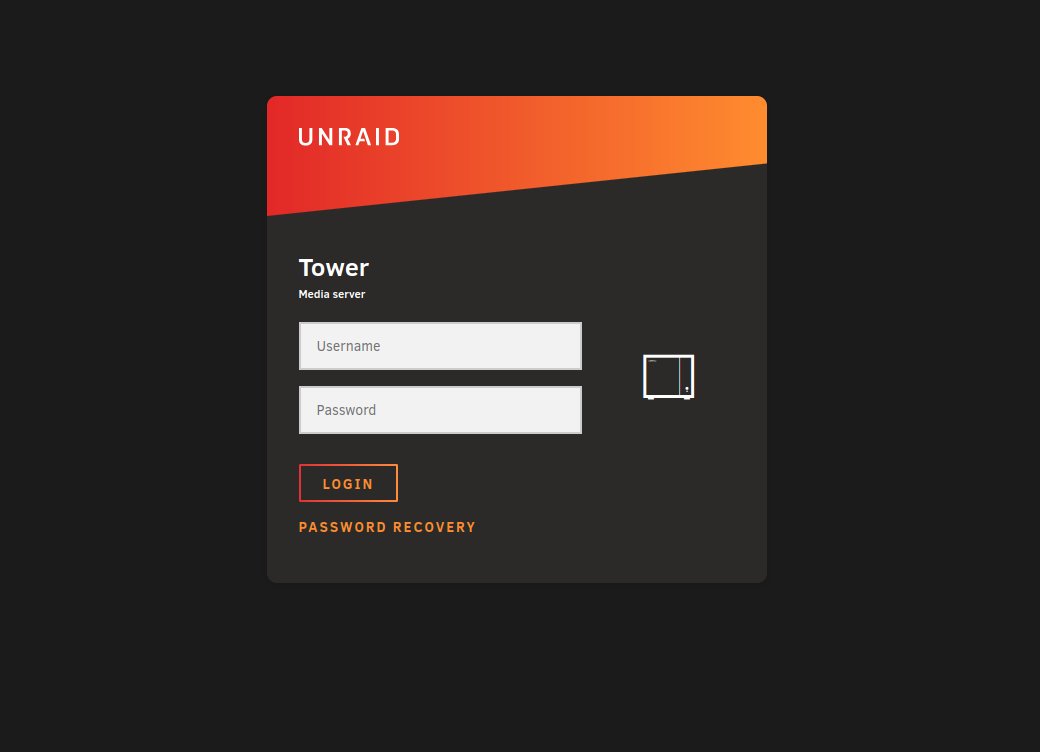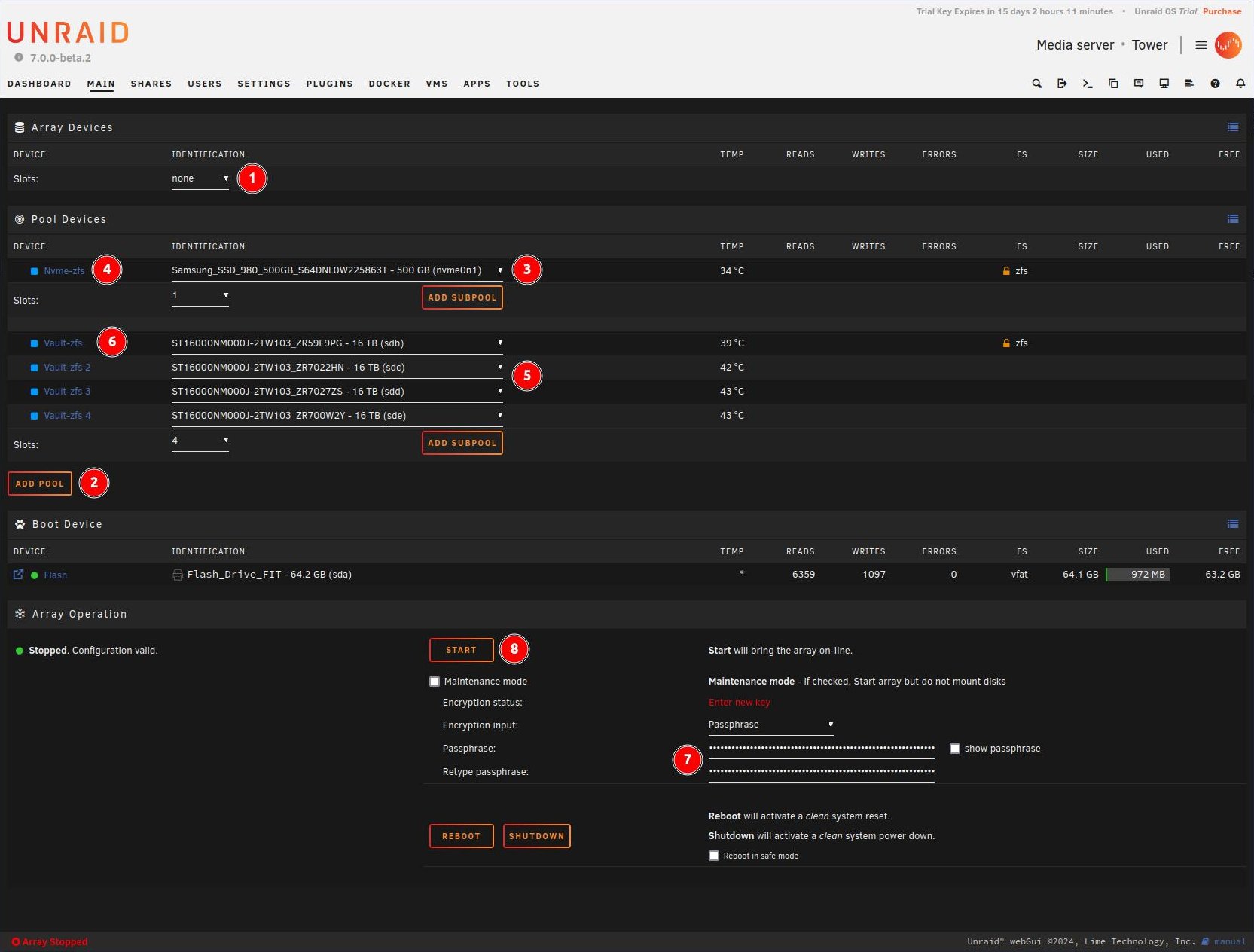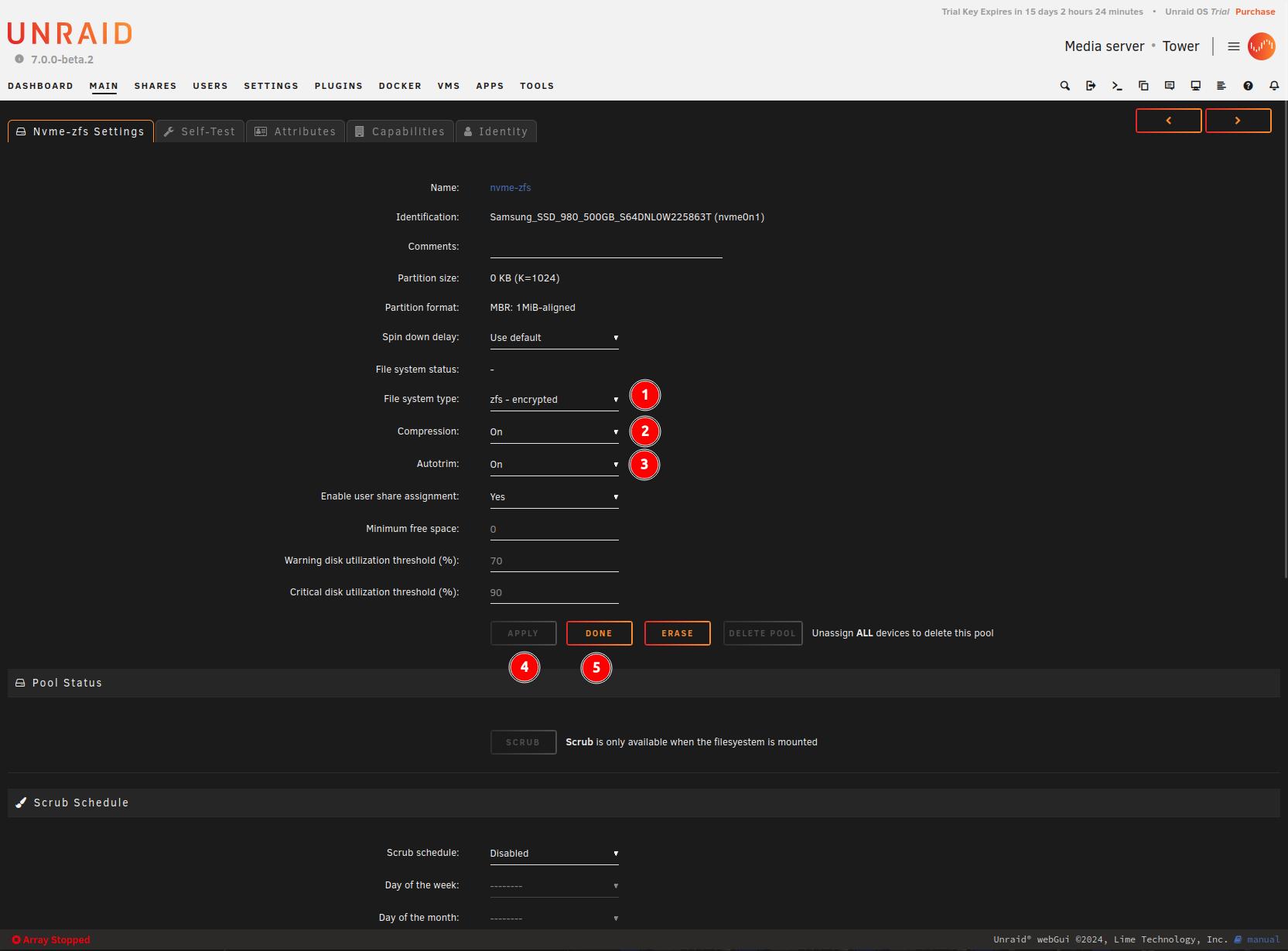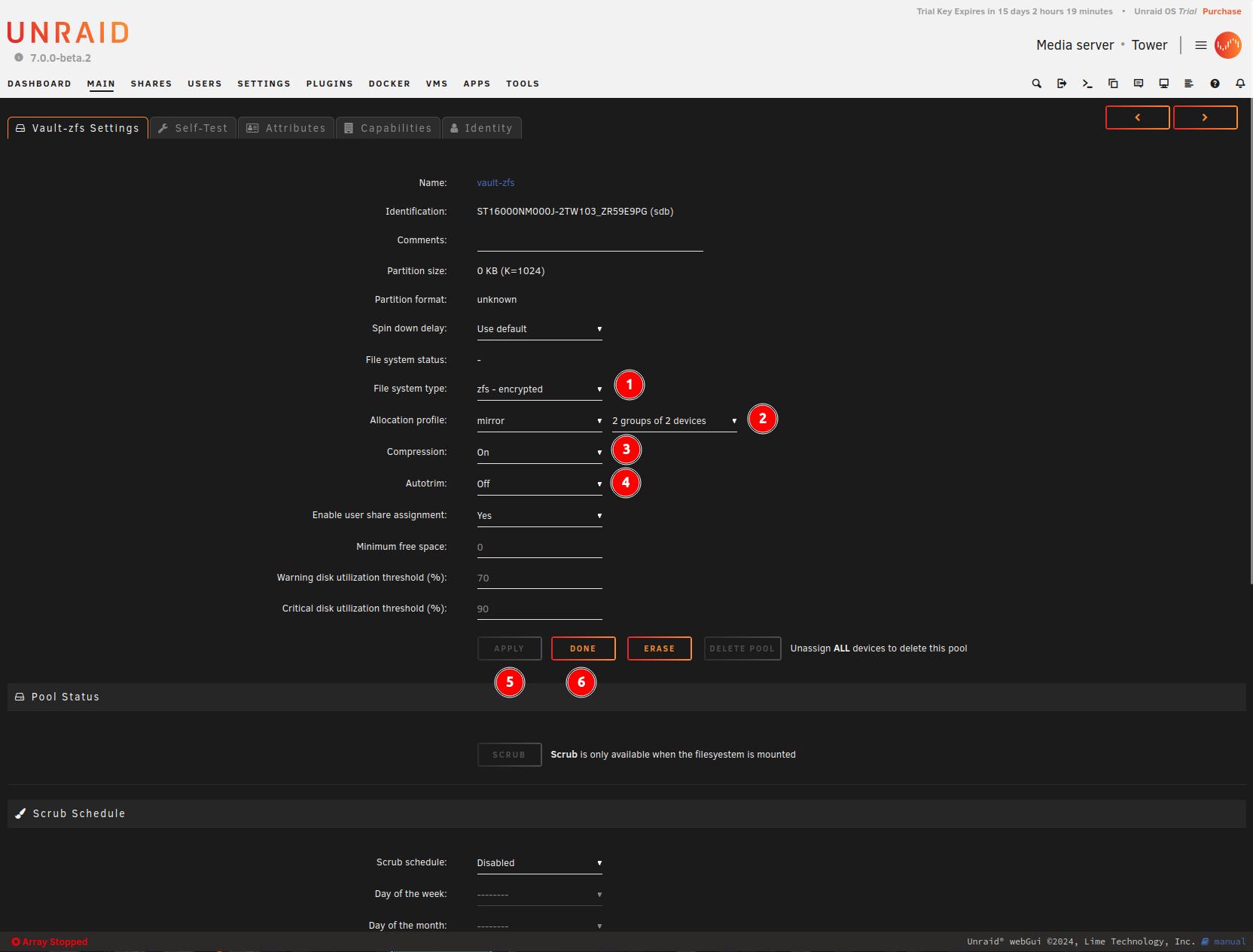unRAID
Time to take unRAID 7.0.0-beta.2 for a quick spin
Disclaimer: I only experimented with unRAID very briefly, so take this article with a grain of salt.
unRAID
During my research for NAS operating systems, unRAID was frequently recommended. So, I decided to give it a quick spin.
unRAID is a proprietary Slackware Linux-based OS developed by Lime Technology Inc. Unlike traditional installations, the OS resides on a USB drive. The unRAID license is tied to the USB flash drive’s GUID, meaning it won’t function on drives without one.
unRAID’s capabilities are categorized into three core areas:
- Software-defined NAS Sharing storage over the network.
- Application server Running Docker containers.
- Hardware virtualization Running virtual machines.
The latest stable version is unRAID 6.12.11, which I’ll install first and then upgrade to 7.0.0-beta.2. While 6.12.11 supports ZFS pools, it enforces the use of Array Devices, which isn’t ideal for my NVMe drive since Array Devices lacks TRIM support. The upcoming unRAID 7 removes this limitation, allowing for standalone ZFS pools. Additionally, unRAID 7 has significant improvements to its ZFS implementation. If I were to consider paying for unRAID, it would be for version 7, at least on paper.
The Uncast Show has a video about upcoming Unraid 7
Updating to 7.0.0-beta.2
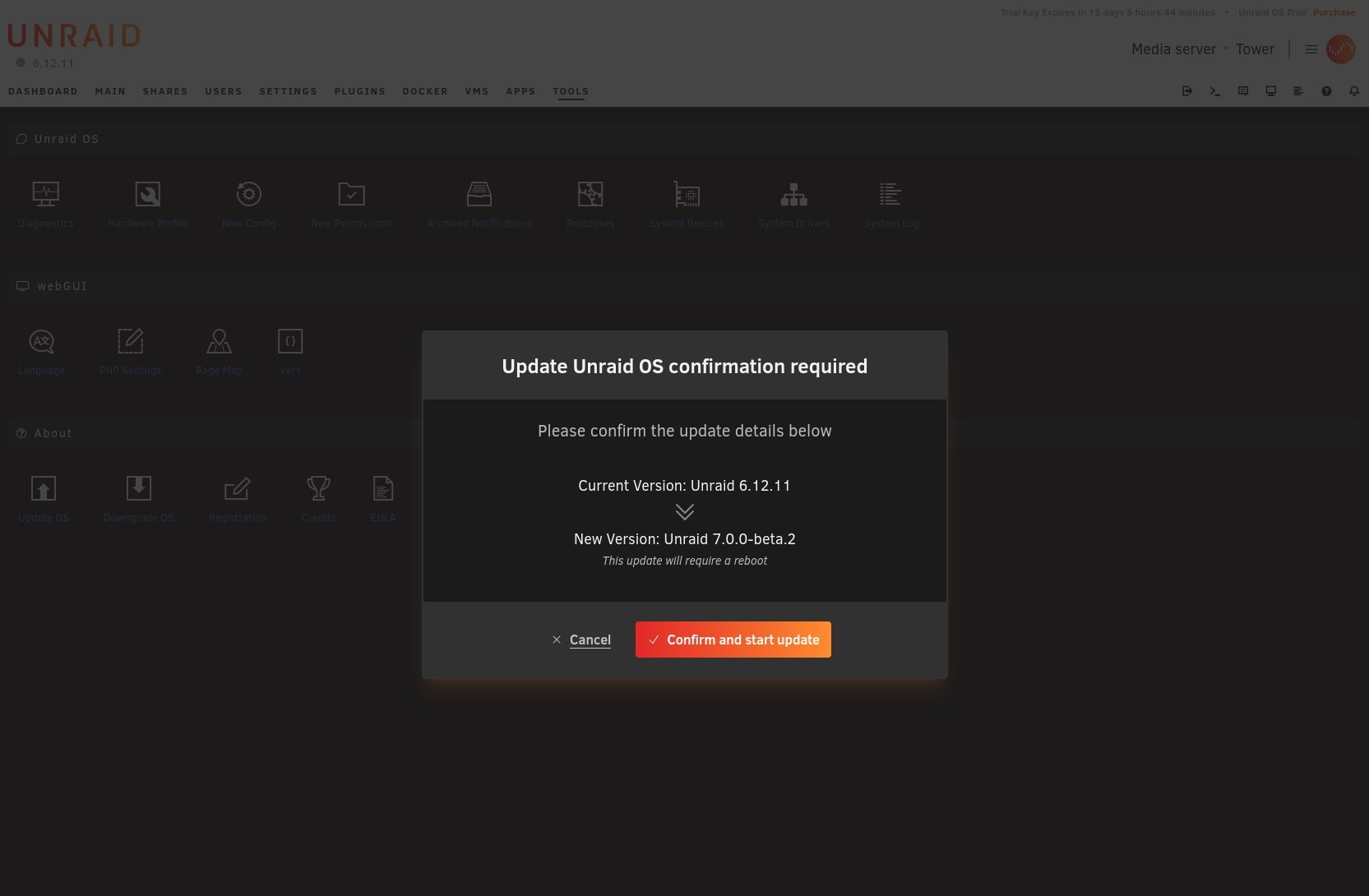 Upgrading to unRAID 7 After flashing the USB drive with the unRAID flashing tool, I booted the system, configured my credentials, opted for the trial period, and switched to the black theme to save my eyes. Then it was time to update the system.
Upgrading to unRAID 7 After flashing the USB drive with the unRAID flashing tool, I booted the system, configured my credentials, opted for the trial period, and switched to the black theme to save my eyes. Then it was time to update the system.
Tools -> Update OS -> Next -> View Changelog to Update -> Continue Update on.. --> Confirm and start update
Setting up ZFS
- Set Array Devices Slots to: none
- Add 2 pools, first named
nvme-zfswith 1 slots, second namedvault-zfswith 4 slots - Set NVMe drive to frist slot
- Enter to
nvme-zfsconfiguration page (screenshot undernmve-zfs Configuration Page) - Set HDDs for the
vault-zfspool - Enter to
vault-zfsconfiguration from first link (screenshot undervault-zfs Configuration Page) - Set passphrase for the encrypted zfs
- Start disk pools
nmve-zfs Configuration Page
- Filesystem type: zfs - encrypted
- Enable compression
- Leave autotrim on
- Apply settings
- Return to Main
vault-zfs Configuration Page
- Filesystem type: zfs - encrypted
- Allocation profile: mirror, 2 groups of 2 devices
- Enable compression
- Disable autotrim
- Apply settings
- Return to Main page
Format Disks
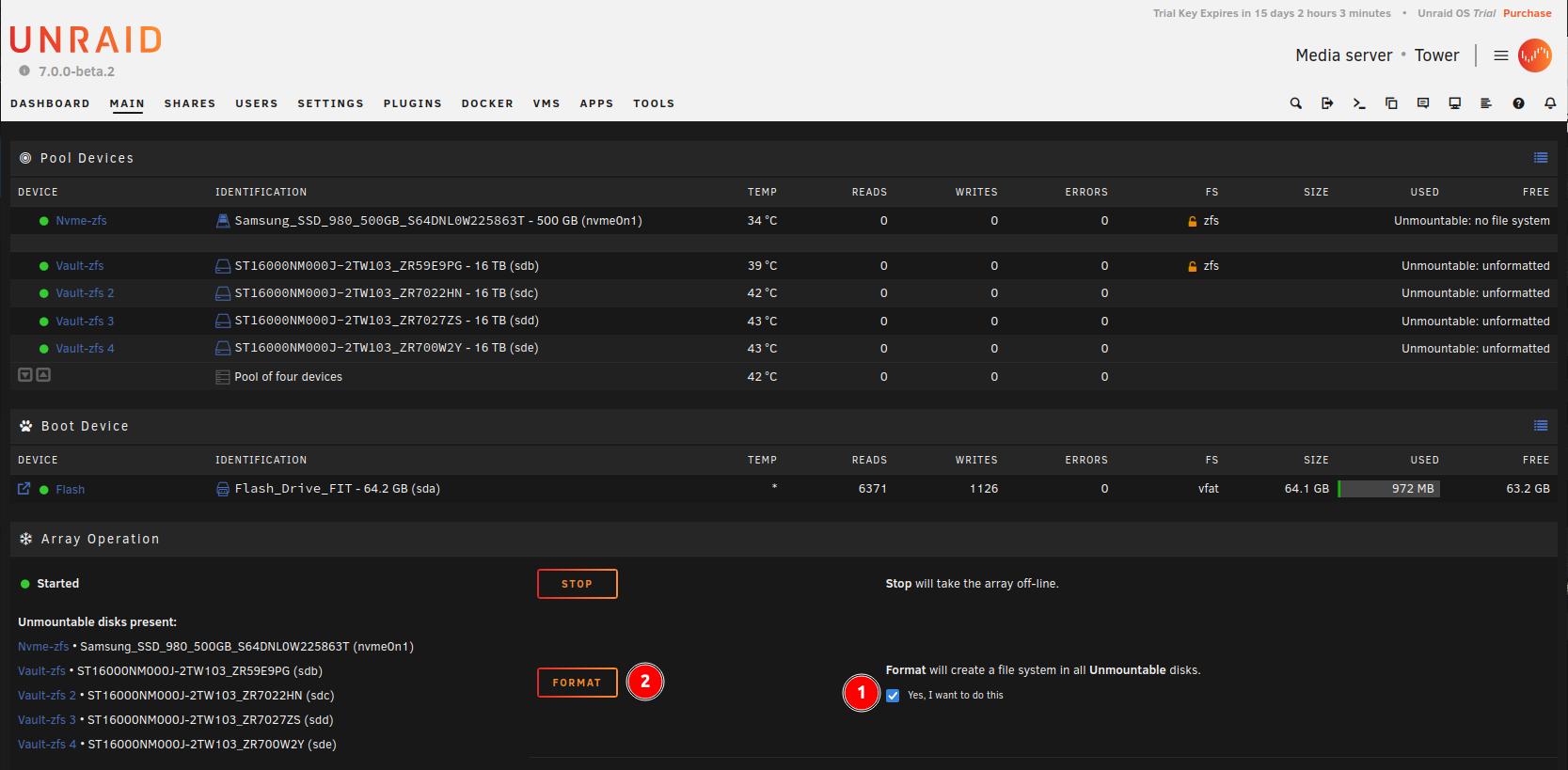 Disk pools have been started but needs to be formatted before disks can be mounted, an error “Unmountable: unformatted” is presented.
Disk pools have been started but needs to be formatted before disks can be mounted, an error “Unmountable: unformatted” is presented.
- Confirm format of the disks, read the warning in shown popup dialog
- Format
Once formatting is complete unRAID mounts disks.
Network Shares
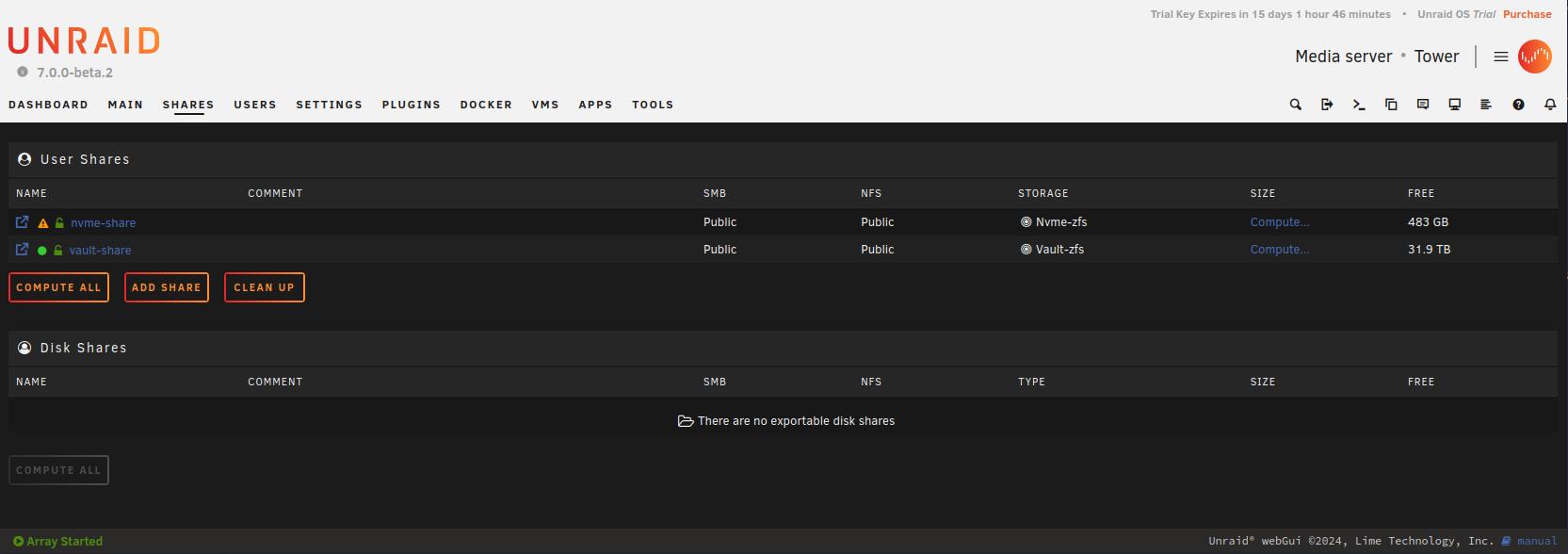 Enable NFS under
Enable NFS under Settings -> NFS
For testing purposes, I created public shares without authentication. I’ll be assessing transfer speeds within my 1Gbps network, which is likely to be the limiting factor here.
1
2
3
4
5
6
7
8
9
10
11
12
# Find out on unRAID server path to nfs shares
root@Tower:~# cat /etc/exports
# See exports(5) for a description.
# This file contains a list of all directories exported to other computers.
# It is used by rpc.nfsd and rpc.mountd.
"/mnt/user/nvme-share" -fsid=102,async,no_subtree_check *(rw,sec=sys,insecure,anongid=100,anonuid=99,all_squash)
"/mnt/user/vault-share" -fsid=103,async,no_subtree_check *(rw,sec=sys,insecure,anongid=100,anonuid=99,all_squash)
# Mount nfs shares on desktop PC
$ sudo mount -t nfs 10.42.42.150:/mnt/user/nvme-share /opt/nfs-nvme-share
$ sudo mount -t nfs 10.42.42.150:/mnt/user/vault-share /opt/nfs-vault-share
Transfer speeds on nfs-nvme-share
1
2
3
4
5
6
7
8
9
10
11
12
13
14
15
16
17
18
19
20
21
22
23
24
25
26
27
28
29
30
31
32
33
34
35
36
37
38
39
40
41
42
43
44
45
46
47
48
49
50
51
52
53
54
55
56
57
58
# Writing 35GB with dd
$ dd if=/dev/zero of=/opt/nfs-nvme-share/35G bs=1M count=35840 conv=fdatasync status=progress
37564186624 bytes (38 GB, 35 GiB) copied, 301 s, 125 MB/s37580963840 bytes (38 GB, 35 GiB) copied, 301.114 s, 125 MB/s
35840+0 records in
35840+0 records out
37580963840 bytes (38 GB, 35 GiB) copied, 320.725 s, 117 MB/s
# Reading 35GB file from remote
$ dd if=/opt/nfs-nvme-share/35G of=/dev/null bs=1M status=progress
37486592000 bytes (37 GB, 35 GiB) copied, 309 s, 121 MB/s
35840+0 records in
35840+0 records out
37580963840 bytes (38 GB, 35 GiB) copied, 309.806 s, 121 MB/s
# Writing ubuntu-24.04 image with rsync
$ rsync --stats --progress -h ubuntu-24.04-desktop-amd64.iso /opt/nfs-nvme-share/
6.11G 100% 170.48MB/s 0:00:34 (xfr#1, to-chk=0/1)
Number of files: 1 (reg: 1)
Number of created files: 1 (reg: 1)
Number of deleted files: 0
Number of regular files transferred: 1
Total file size: 6.11G bytes
Total transferred file size: 6.11G bytes
Literal data: 6.11G bytes
Matched data: 0 bytes
File list size: 0
File list generation time: 0.001 seconds
File list transfer time: 0.000 seconds
Total bytes sent: 6.12G
Total bytes received: 35
sent 6.12G bytes received 35 bytes 104.55M bytes/sec
total size is 6.11G speedup is 1.00
# Reading ubuntu-24.04 image with rsync
$ rsync --stats --progress -h /opt/nfs-nvme-share/ubuntu-24.04-desktop-amd64.iso .
6.11G 100% 104.71MB/s 0:00:55 (xfr#1, to-chk=0/1)
Number of files: 1 (reg: 1)
Number of created files: 1 (reg: 1)
Number of deleted files: 0
Number of regular files transferred: 1
Total file size: 6.11G bytes
Total transferred file size: 6.11G bytes
Literal data: 6.11G bytes
Matched data: 0 bytes
File list size: 0
File list generation time: 0.001 seconds
File list transfer time: 0.000 seconds
Total bytes sent: 6.12G
Total bytes received: 35
sent 6.12G bytes received 35 bytes 108.25M bytes/sec
total size is 6.11G speedup is 1.00
 RAM utilisation while testing NVMe shares
RAM utilisation while testing NVMe shares
Overall CPU load was ~7% during write and ~10% during read. I restarted the device between write and read to clear ZFS cache.
Transfer speeds on nfs-vault-share
1
2
3
4
5
6
7
8
9
10
11
12
13
14
15
16
17
18
19
20
21
22
23
24
25
26
27
28
29
30
31
32
33
34
35
36
37
38
39
40
41
42
43
44
45
46
47
48
49
50
51
52
53
54
55
56
57
58
59
60
# Writing 35GB with dd
$ dd if=/dev/zero of=/opt/nfs-vault-share/35G bs=1M count=35840 conv=fdatasync status=progress
37547409408 bytes (38 GB, 35 GiB) copied, 297 s, 126 MB/s37580963840 bytes (38 GB, 35 GiB) copied, 297.292 s, 126 MB/s
35840+0 records in
35840+0 records out
37580963840 bytes (38 GB, 35 GiB) copied, 320.994 s, 117 MB/s
# Reading 35GB file from remote
$ dd if=/opt/nfs-vault-share/35G of=/dev/null bs=1M status=progress
37549506560 bytes (38 GB, 35 GiB) copied, 324 s, 116 MB/s
35840+0 records in
35840+0 records out
37580963840 bytes (38 GB, 35 GiB) copied, 324.276 s, 116 MB/s
# Writing ubuntu-24.04 image with rsync
$ rsync --stats --progress -h ubuntu-24.04-desktop-amd64.iso /opt/nfs-vault-share/
6.11G 100% 185.20MB/s 0:00:31 (xfr#1, to-chk=0/1)
Number of files: 1 (reg: 1)
Number of created files: 1 (reg: 1)
Number of deleted files: 0
Number of regular files transferred: 1
Total file size: 6.11G bytes
Total transferred file size: 6.11G bytes
Literal data: 6.11G bytes
Matched data: 0 bytes
File list size: 0
File list generation time: 0.001 seconds
File list transfer time: 0.000 seconds
Total bytes sent: 6.12G
Total bytes received: 35
sent 6.12G bytes received 35 bytes 104.55M bytes/sec
total size is 6.11G speedup is 1.00
# Reading ubuntu-24.04 image with rsync
$ rsync --stats --progress -h /opt/nfs-vault-share/ubuntu-24.04-desktop-amd64.iso .
6.11G 100% 105.81MB/s 0:00:55 (xfr#1, to-chk=0/1)
Number of files: 1 (reg: 1)
Number of created files: 1 (reg: 1)
Number of deleted files: 0
Number of regular files transferred: 1
Total file size: 6.11G bytes
Total transferred file size: 6.11G bytes
Literal data: 6.11G bytes
Matched data: 0 bytes
File list size: 0
File list generation time: 0.002 seconds
File list transfer time: 0.000 seconds
Total bytes sent: 6.12G
Total bytes received: 35
sent 6.12G bytes received 35 bytes 110.20M bytes/sec
total size is 6.11G speedup is 1.00
 RAM utilisation while testing HDD shares Overall CPU load was ~9% during write and ~12% during read. I restarted the device between write and read to clear ZFS cache.
RAM utilisation while testing HDD shares Overall CPU load was ~9% during write and ~12% during read. I restarted the device between write and read to clear ZFS cache.
Testing throughput with iperf3
Iperf tests were ran from my desktop PC, acting as a client.
TCP Tests
1
2
3
4
5
6
7
8
9
10
11
12
13
14
15
16
17
18
19
20
21
22
23
24
25
26
27
28
29
30
31
32
33
34
35
36
37
38
39
40
41
42
43
44
45
46
47
48
49
50
51
52
53
54
55
56
57
58
59
60
61
62
# Run basic TCP test
$ iperf3 -c 10.42.42.150
- - - - - - - - - - - - - - - - - - - - - - - - -
[ ID] Interval Transfer Bitrate Retr
[ 5] 0.00-10.00 sec 1.10 GBytes 943 Mbits/sec 0 sender
[ 5] 0.00-10.00 sec 1.10 GBytes 941 Mbits/sec receiver
# Run basic TCP test with 10 parallel streams
$ iperf3 -c 10.42.42.150 -P 10
- - - - - - - - - - - - - - - - - - - - - - - - -
[ ID] Interval Transfer Bitrate Retr
[ 5] 0.00-10.00 sec 113 MBytes 94.8 Mbits/sec 0 sender
[ 5] 0.00-10.01 sec 112 MBytes 93.6 Mbits/sec receiver
[ 7] 0.00-10.00 sec 114 MBytes 95.3 Mbits/sec 0 sender
[ 7] 0.00-10.01 sec 112 MBytes 94.1 Mbits/sec receiver
[ 9] 0.00-10.00 sec 114 MBytes 95.9 Mbits/sec 0 sender
[ 9] 0.00-10.01 sec 113 MBytes 95.0 Mbits/sec receiver
[ 11] 0.00-10.00 sec 114 MBytes 95.7 Mbits/sec 0 sender
[ 11] 0.00-10.01 sec 113 MBytes 94.4 Mbits/sec receiver
[ 13] 0.00-10.00 sec 114 MBytes 95.4 Mbits/sec 0 sender
[ 13] 0.00-10.01 sec 113 MBytes 94.4 Mbits/sec receiver
[ 15] 0.00-10.00 sec 114 MBytes 95.6 Mbits/sec 0 sender
[ 15] 0.00-10.01 sec 113 MBytes 94.3 Mbits/sec receiver
[ 17] 0.00-10.00 sec 113 MBytes 95.1 Mbits/sec 0 sender
[ 17] 0.00-10.01 sec 113 MBytes 94.3 Mbits/sec receiver
[ 19] 0.00-10.00 sec 112 MBytes 93.6 Mbits/sec 0 sender
[ 19] 0.00-10.01 sec 110 MBytes 92.4 Mbits/sec receiver
[ 21] 0.00-10.00 sec 114 MBytes 95.3 Mbits/sec 0 sender
[ 21] 0.00-10.01 sec 113 MBytes 94.3 Mbits/sec receiver
[ 23] 0.00-10.00 sec 114 MBytes 95.2 Mbits/sec 0 sender
[ 23] 0.00-10.01 sec 113 MBytes 94.3 Mbits/sec receiver
[SUM] 0.00-10.00 sec 1.11 GBytes 952 Mbits/sec 0 sender
[SUM] 0.00-10.01 sec 1.10 GBytes 941 Mbits/sec receiver
# Run basic TCP test with 10 parallel streams in reverse
$ iperf3 -c 10.42.42.150 -P 10 -R
- - - - - - - - - - - - - - - - - - - - - - - - -
[ ID] Interval Transfer Bitrate Retr
[ 5] 0.00-10.00 sec 114 MBytes 95.3 Mbits/sec 0 sender
[ 5] 0.00-10.00 sec 112 MBytes 94.2 Mbits/sec receiver
[ 7] 0.00-10.00 sec 114 MBytes 95.3 Mbits/sec 0 sender
[ 7] 0.00-10.00 sec 112 MBytes 94.1 Mbits/sec receiver
[ 9] 0.00-10.00 sec 114 MBytes 95.6 Mbits/sec 0 sender
[ 9] 0.00-10.00 sec 112 MBytes 94.1 Mbits/sec receiver
[ 11] 0.00-10.00 sec 113 MBytes 95.2 Mbits/sec 31 sender
[ 11] 0.00-10.00 sec 112 MBytes 94.1 Mbits/sec receiver
[ 13] 0.00-10.00 sec 114 MBytes 95.3 Mbits/sec 34 sender
[ 13] 0.00-10.00 sec 112 MBytes 94.1 Mbits/sec receiver
[ 15] 0.00-10.00 sec 113 MBytes 94.7 Mbits/sec 0 sender
[ 15] 0.00-10.00 sec 112 MBytes 94.0 Mbits/sec receiver
[ 17] 0.00-10.00 sec 113 MBytes 94.9 Mbits/sec 0 sender
[ 17] 0.00-10.00 sec 112 MBytes 94.1 Mbits/sec receiver
[ 19] 0.00-10.00 sec 113 MBytes 94.8 Mbits/sec 0 sender
[ 19] 0.00-10.00 sec 112 MBytes 94.0 Mbits/sec receiver
[ 21] 0.00-10.00 sec 113 MBytes 94.8 Mbits/sec 0 sender
[ 21] 0.00-10.00 sec 112 MBytes 94.0 Mbits/sec receiver
[ 23] 0.00-10.00 sec 113 MBytes 94.8 Mbits/sec 0 sender
[ 23] 0.00-10.00 sec 112 MBytes 94.1 Mbits/sec receiver
[SUM] 0.00-10.00 sec 1.11 GBytes 951 Mbits/sec 65 sender
[SUM] 0.00-10.00 sec 1.09 GBytes 940 Mbits/sec receiver
UDP Tests
1
2
3
4
5
6
7
8
9
10
11
12
13
14
15
16
17
18
19
20
21
22
23
24
25
26
27
28
29
30
31
32
33
34
35
36
37
38
39
40
41
42
43
44
45
46
47
48
49
50
51
52
53
54
55
56
57
58
59
60
61
62
# Run UDP test with 1000 Mbit/sec connection
$ iperf3 -c 10.42.42.150 -u -b 1000M
- - - - - - - - - - - - - - - - - - - - - - - - -
[ ID] Interval Transfer Bitrate Jitter Lost/Total Datagrams
[ 5] 0.00-10.00 sec 1.11 GBytes 956 Mbits/sec 0.000 ms 0/825559 (0%) sender
[ 5] 0.00-10.00 sec 1.11 GBytes 956 Mbits/sec 0.033 ms 0/825557 (0%) receiver
# Run UDP test with 1000 Mbit/sec connection and with 10 parallel streams
$ iperf3 -c 10.42.42.150 -u -b 1000M -P 10
- - - - - - - - - - - - - - - - - - - - - - - - -
[ ID] Interval Transfer Bitrate Jitter Lost/Total Datagrams
[ 5] 0.00-10.00 sec 114 MBytes 95.7 Mbits/sec 0.000 ms 0/82640 (0%) sender
[ 5] 0.00-10.01 sec 114 MBytes 95.7 Mbits/sec 0.038 ms 0/82640 (0%) receiver
[ 7] 0.00-10.00 sec 114 MBytes 95.6 Mbits/sec 0.000 ms 0/82566 (0%) sender
[ 7] 0.00-10.01 sec 114 MBytes 95.6 Mbits/sec 0.378 ms 0/82566 (0%) receiver
[ 9] 0.00-10.00 sec 114 MBytes 95.6 Mbits/sec 0.000 ms 0/82568 (0%) sender
[ 9] 0.00-10.01 sec 114 MBytes 95.6 Mbits/sec 0.127 ms 0/82568 (0%) receiver
[ 11] 0.00-10.00 sec 114 MBytes 95.8 Mbits/sec 0.000 ms 0/82748 (0%) sender
[ 11] 0.00-10.01 sec 114 MBytes 95.8 Mbits/sec 0.304 ms 0/82748 (0%) receiver
[ 13] 0.00-10.00 sec 114 MBytes 95.9 Mbits/sec 0.000 ms 0/82833 (0%) sender
[ 13] 0.00-10.01 sec 114 MBytes 95.9 Mbits/sec 0.040 ms 0/82832 (0%) receiver
[ 15] 0.00-10.00 sec 114 MBytes 95.2 Mbits/sec 0.000 ms 0/82194 (0%) sender
[ 15] 0.00-10.01 sec 114 MBytes 95.1 Mbits/sec 0.041 ms 0/82194 (0%) receiver
[ 17] 0.00-10.00 sec 114 MBytes 95.3 Mbits/sec 0.000 ms 0/82294 (0%) sender
[ 17] 0.00-10.01 sec 114 MBytes 95.3 Mbits/sec 0.064 ms 0/82293 (0%) receiver
[ 19] 0.00-10.00 sec 114 MBytes 96.0 Mbits/sec 0.000 ms 0/82899 (0%) sender
[ 19] 0.00-10.01 sec 114 MBytes 96.0 Mbits/sec 0.215 ms 0/82899 (0%) receiver
[ 21] 0.00-10.00 sec 115 MBytes 96.2 Mbits/sec 0.000 ms 0/83015 (0%) sender
[ 21] 0.00-10.01 sec 115 MBytes 96.1 Mbits/sec 0.133 ms 0/83015 (0%) receiver
[ 23] 0.00-10.00 sec 114 MBytes 95.5 Mbits/sec 0.000 ms 0/82446 (0%) sender
[ 23] 0.00-10.01 sec 114 MBytes 95.4 Mbits/sec 0.298 ms 0/82446 (0%) receiver
[SUM] 0.00-10.00 sec 1.11 GBytes 957 Mbits/sec 0.000 ms 0/826203 (0%) sender
[SUM] 0.00-10.01 sec 1.11 GBytes 956 Mbits/sec 0.164 ms 0/826201 (0%) receiver
# Run UDP test with 1000 Mbit/sec connection and with 10 parallel streams in reverse
$ iperf3 -c 10.42.42.150 -u -b 1000M -P 10 -R
- - - - - - - - - - - - - - - - - - - - - - - - -
[ ID] Interval Transfer Bitrate Jitter Lost/Total Datagrams
[ 5] 0.00-10.00 sec 114 MBytes 95.7 Mbits/sec 0.000 ms 0/0 (0%) sender
[ 5] 0.00-10.00 sec 114 MBytes 95.6 Mbits/sec 0.039 ms 0/82561 (0%) receiver
[ 7] 0.00-10.00 sec 114 MBytes 95.7 Mbits/sec 0.000 ms 0/0 (0%) sender
[ 7] 0.00-10.00 sec 114 MBytes 95.6 Mbits/sec 0.041 ms 0/82561 (0%) receiver
[ 9] 0.00-10.00 sec 114 MBytes 95.7 Mbits/sec 0.000 ms 0/0 (0%) sender
[ 9] 0.00-10.00 sec 114 MBytes 95.6 Mbits/sec 0.051 ms 0/82561 (0%) receiver
[ 11] 0.00-10.00 sec 114 MBytes 95.7 Mbits/sec 0.000 ms 0/0 (0%) sender
[ 11] 0.00-10.00 sec 114 MBytes 95.6 Mbits/sec 0.045 ms 0/82560 (0%) receiver
[ 13] 0.00-10.00 sec 114 MBytes 95.7 Mbits/sec 0.000 ms 0/0 (0%) sender
[ 13] 0.00-10.00 sec 114 MBytes 95.6 Mbits/sec 0.041 ms 0/82561 (0%) receiver
[ 15] 0.00-10.00 sec 114 MBytes 95.7 Mbits/sec 0.000 ms 0/0 (0%) sender
[ 15] 0.00-10.00 sec 114 MBytes 95.6 Mbits/sec 0.049 ms 0/82560 (0%) receiver
[ 17] 0.00-10.00 sec 114 MBytes 95.7 Mbits/sec 0.000 ms 0/0 (0%) sender
[ 17] 0.00-10.00 sec 114 MBytes 95.6 Mbits/sec 0.050 ms 0/82560 (0%) receiver
[ 19] 0.00-10.00 sec 114 MBytes 95.7 Mbits/sec 0.000 ms 0/0 (0%) sender
[ 19] 0.00-10.00 sec 114 MBytes 95.6 Mbits/sec 0.054 ms 0/82560 (0%) receiver
[ 21] 0.00-10.00 sec 114 MBytes 95.7 Mbits/sec 0.000 ms 0/0 (0%) sender
[ 21] 0.00-10.00 sec 114 MBytes 95.6 Mbits/sec 0.046 ms 0/82559 (0%) receiver
[ 23] 0.00-10.00 sec 114 MBytes 95.7 Mbits/sec 0.000 ms 0/0 (0%) sender
[ 23] 0.00-10.00 sec 114 MBytes 95.6 Mbits/sec 0.041 ms 0/82575 (0%) receiver
[SUM] 0.00-10.00 sec 1.11 GBytes 957 Mbits/sec 0.000 ms 0/0 (0%) sender
[SUM] 0.00-10.00 sec 1.11 GBytes 956 Mbits/sec 0.046 ms 0/825618 (0%) receiver
Power Consumption
At idle, the device consumed approximately 34 Watts. During file transfers the power consumption increased to 43 Watts.
Conclusion
unRAID proved to be remarkably user-friendly for setting up ZFS pools and creating shares. It’s easy to see why it’s so widely recommended, and the extensive collection of community-provided applications is a major plus.
However, while unRAID supports ZFS encryption, the operating system disk itself remains unencrypted. Personally I have been using full-disk encryption for a long time and it is a crucial part of the security in case of theft or unauthorized access. This limitation in unRAID’s current implementation is a significant drawback for me.
